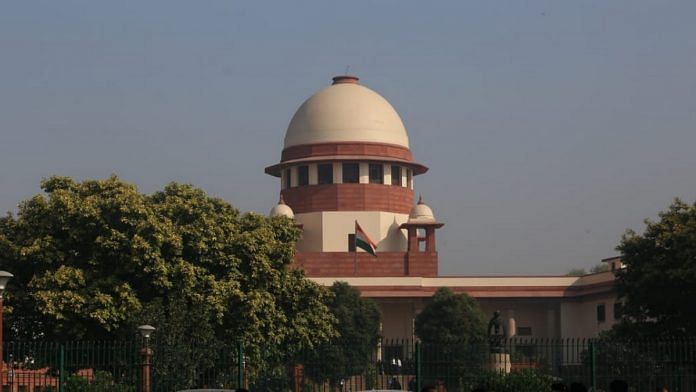New Delhi: The Supreme Court will begin hearing petitions challenging the electoral bonds scheme Monday.
The petitions, filed by the Communist Party of India (Marxist) and two NGOs — Association for Democratic Reforms (ADR) and Common Cause — will be heard by a bench comprising Chief Justice of India S.A. Bobde and Justices B.R. Gavai and Surya Kant.
The hearing comes at a time when the 13th tranche of electoral bonds are being sold — the process began on 13 January and will continue until 22 January.
Also read: India now has over 2,500 political parties, some suspected of ‘black money’ operations
What are electoral bonds?
Electoral bonds are bearer instruments, like promissory notes, payable to the bearer on demand. They can be used by individuals and firms incorporated in India to make donations to political parties.
Bonds worth Rs 1,000 to Rs 1 crore can be purchased from the State Bank of India using a KYC-compliant bank account, with no upper limit on the donation amount. Political parties can encash the bond within 15 days, with the identity of the donor available only to the bank.
Electoral bonds were introduced by the Finance Act, 2017, which amended various provisions of the Reserve Bank of India Act (RBI Act), Representation of the People Act (RP Act), Income Tax Act, Companies Act, and the Foreign Contribution (Regulation) Act (FCRA).
The RP Act amendment exempts political parties from the requirement to record donations received through electoral bonds in their contribution reports to the Election Commission. The amendments to the FCRA allow foreign companies owning majority stakes in Indian companies to donate to political parties.
The IT Act amendments allow anonymous donations up to Rs 20,000 and exempt donors from providing their names or PAN details.
‘Opacity’ in political funding
The essence of the scheme is that political parties are not required to maintain any record of the donations or the names and addresses of donors. The scheme ensures that the identity of the donor is completely confidential.
In fact, paragraph 7(4) of the notification on the scheme says that the authorised bank will not disclose any information about the purchaser of the bonds to any authority for any purpose.
The petition filed by the NGOs objects to the “opacity in political funding” introduced by the electoral bonds. It contends that electoral bonds are “designed to keep the identity of donors secret from company auditors, the Income Tax authorities, the Election Commission, and finally from the public at large who are the voters”.
This, it argues, is against public policy, as it reduces transparency and permits foreign influence in government policies.
On similar lines, the CPI(M)’s petition contends that the amendments “jeopardise the very foundation of Indian democracy”, submitting that the “confluence of uncapped corporate resources funding political parties can only lead to private corporate interests taking precedence over the needs and rights of the people of the state in policy considerations”.
It claims the amendments run contrary to the recommendations of the Election Commission and Law Commission of India.
The petitions also question the passing of the Finance Act as a money bill, bypassing the Rajya Sabha. A money bill originates in the Lok Sabha, and once passed by a simple majority, it is sent to the Rajya Sabha for its recommendations, which are not binding.
Also read: 7 cases to watch out for when Supreme Court reopens today after winter break
EC in favour of transparency
Notably, the EC has taken a stand contrary to the central government’s stand in the Supreme Court.
While the Centre has maintained that the scheme will promote transparency in political funding as donors are required to donate through verified KYC accounts, the EC submitted that the scheme would have “serious repercussions/ impact on the transparency aspect of political finance/funding of political parties”.
Specifically referring to the amendments, EC submitted that the amendments to FCRA “would allow unchecked foreign funding of political parties in India which could lead to Indian policies being influenced by foreign companies”.
It tore into the other amendments as well, while maintaining that “political parties are major stakeholders in a democracy and they should be accountable to the public”.
Details in a sealed cover
On 12 April last year, the Supreme Court issued an interim order directing all political parties to submit the details of all bonds received until 15 May, 2019 to the Election Commission (EC) by 30 May, 2019.
In its order, the court noted that the contentions before it “give rise to weighty issues which have a tremendous bearing on the sanctity of the electoral process in the country”, and that these issues would require an “in depth hearing”.
The bench comprising of then-CJI Ranjan Gogoi and Justices Deepak Gupta and Sanjiv Khanna then refused to put a stay on the scheme, and directed that the details be submitted to the EC in a sealed cover.
Also read: EC had flagged concerns over electoral bonds to Modi govt after Lok Sabha elections too




The time when the apex court issued bold, interventionist orders is now a faint memory. May it recur.